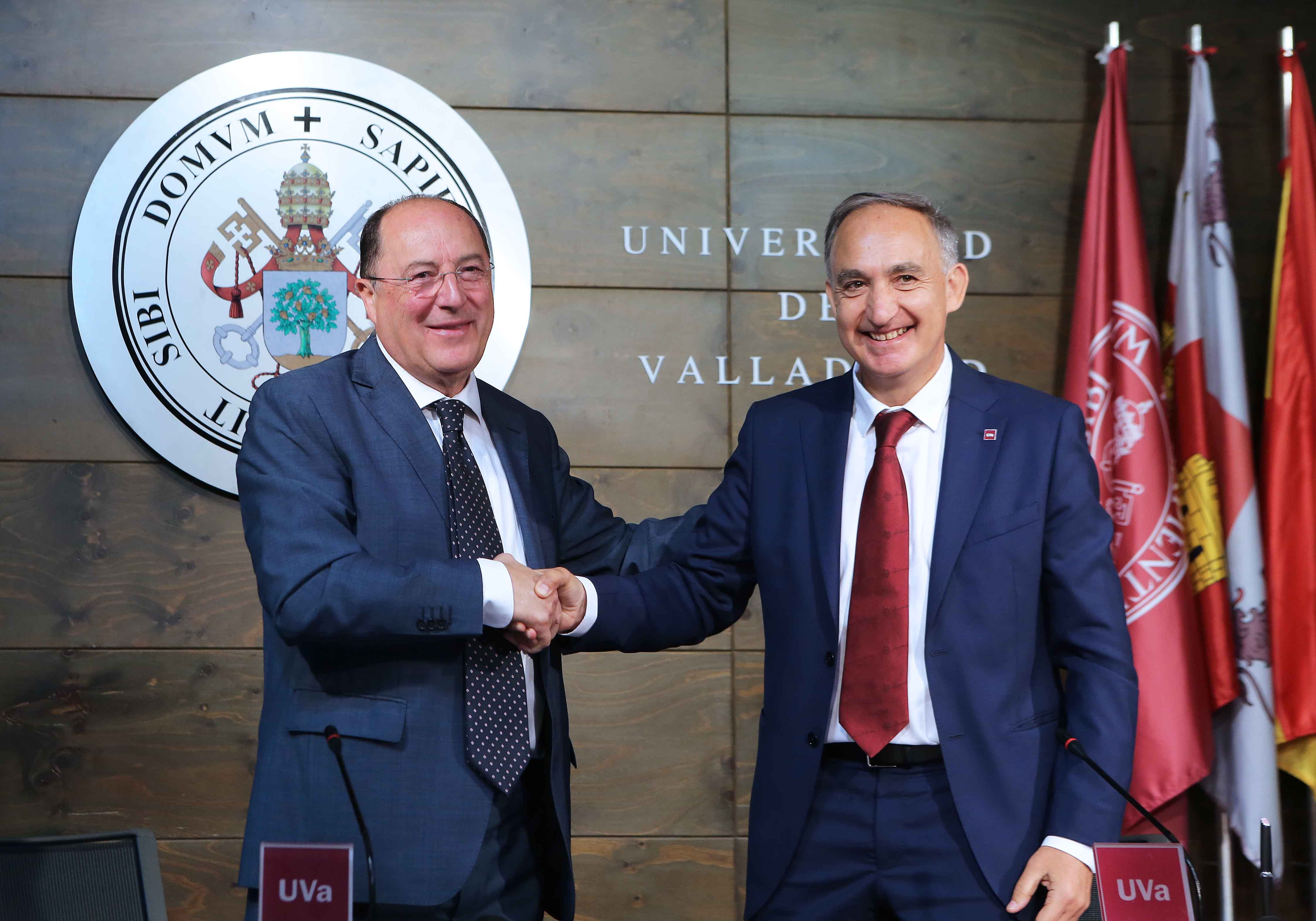
The dean of the University of Valladolid, Antonio Largo Cabrerizo, and the president of Matarromera Family Wineries, Carlos Moro, today signed a collaboration framework agreement that will allow both entities to develop future projects together, as well as protecting the results of an investigation developing a patent for the application of grape extract in ophthalmological treatments. This jointly held patent, which is currently in the development phase, innovates the use and benefits of the Eminol® grape extract in eye cells. The antioxidant capacity of this extract benefits and protects the eyes from oxidative stress and minimizes the risk of suffering from ocular diseases, as the extract is harmless, antifungal and also has anti-inflammatory properties.
This investigation was carried out by the Institute for Applied Ophthalmobiology (IOBA) and Matarromera’s R&D department. This is Matarromera Family Wineries’ twelfth patent, and the first whose ownership is shared with the University of Valladolid. The Eminol® grape extract is patented by the company, developed by its R&D team and produced in the Polyphenol Extraction Plant created for this purpose in Valbuena de Duero. Dr Girish Kumar from the University has shown, through various different studies, that the antioxidant capacity of this extract developed by Matarromera is far superior to other principles used in the pharmaceutical industry, which translates into increased cell survival preventing degenerative processes. This is due to the high concentration and richness of polyphenols present in the grapes from the vineyards of Matarromera Family Wineries.
The signing of today’s agreement marks another step forward in this fruitful relationship. Through this agreement, the University of Valladolid and Matarromera Family Wineries are committed, amongst other things, to providing knowledge and combining efforts to promote the joint development of new research, development and innovation projects; to the search for joint financing for said projects; to attending to calls for aid or grants of an autonomous, national and European nature; and to the assistance and technological advice of the university.
The collaboration between Matarromera and the University of Valladolid, through various R&D projects, dates back to 18 years ago, a relationship that has involved different groups and research institutes of the University of Valladolid, such as the IOBA (Institute for Applied Ophthalmobiology) or the IBGM (Institute of Biology and Molecular Genetics), depending on the areas of collaboration. Amongst the most notable of these collaborations are: the agreements for research and dissemination of the archaeological heritage of the archaeological area of Pintia; the applications of electronic sensors (electronic nose) to the evaluation of organoleptic properties; the improvement of the extraction and purification of polyphenols: cosmetic application and medical applications, or the application of energy-optimized microwave technologies to maintain the maximum properties of polyphenols, as well as very selective obtainment with a high degree of purity.
The University of Valladolid and Matarromera have worked on several projects of national and European coverage, amongst the most prominent of which are the collaboration between both entities within the framework of the WINE PANEL TEST project, through which an electronic instrument capable of carrying out organoleptic analysis of wine was developed; the WINESENSE project, which studied new technological processes for the extraction and valorisation of pomace; or the NUDACE project, for the development of functional ingredients derived from olives to slow down degenerative processes associated with aging.
Matarromera Family Wineries is the company in its sector which dedicates the largest portion of its revenue to R&D, with an investment of over 45 million euros in recent years to develop 12 patents and 90 national and international research projects during the last decade. Proof of this is that last year its president and founder, Carlos Moro, was awarded the National Innovation Award, the highest honour in this field in Spain, by HM King Philip VI.
The University of Valladolid has considerable interest in pursuing this route, as evidenced by the fact that it ranks fifth amongst the country’s public universities in terms of its number of national patents, and second amongst generalist and non-polytechnic universities. Furthermore, the University of Valladolid is amongst the top 10 patent applicants in the country as a whole, including companies, private individuals and other research centres. The returns obtained by the university for licensing patents and other knowledge outcomes exceed 200,000 euros a year.